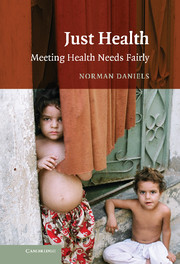Book contents
- Frontmatter
- Contents
- Acknowledgments
- Introduction
- PART I A THEORY OF JUSTICE AND HEALTH
- 1 Three Questions of Justice
- 2 What Is the Special Moral Importance of Health?
- 3 When Are Health Inequalities Unjust?
- 4 How Can We Meet Health Needs Fairly When We Can't Meet Them All?
- 5 What Do We Owe Each Other?
- PART II CHALLENGES
- PART III USES
- References
- Index
3 - When Are Health Inequalities Unjust?
The Social Determinants of Health
Published online by Cambridge University Press: 05 June 2012
- Frontmatter
- Contents
- Acknowledgments
- Introduction
- PART I A THEORY OF JUSTICE AND HEALTH
- 1 Three Questions of Justice
- 2 What Is the Special Moral Importance of Health?
- 3 When Are Health Inequalities Unjust?
- 4 How Can We Meet Health Needs Fairly When We Can't Meet Them All?
- 5 What Do We Owe Each Other?
- PART II CHALLENGES
- PART III USES
- References
- Index
Summary
When is an inequality in health status between different socioeconomic groups unjust? More generally, when is an inequality in health status between different demographic groups unjust? An account of just health should help us determine which health inequalities are unjust and which are acceptable. Recognizing these distinctions will help us to remedy injustice and establish just institutions.
These versions of the second Focal Question (see Chapter 1) involve issues that move beyond simply knowing why health is of special moral importance and how that importance can guide us in extending general theories of justice to matters of health and its distribution. Knowing that protecting health protects opportunity does not, by itelf, tell us when inequalities in health, like inequalities in opportunity more generally, are unjust. Health is produced not just by having access to medical prevention and treatment but also, to a measurably great extent, by the cumulative experience of social conditions across the lifecourse. When a sixty-year old patient presents to the emergency room with a heart attack to receive medical treatment, that encounter represents the results of bodily insults that accumulated over a lifetime. Medical care is, figuratively speaking, “the ambulance waiting at the bottom of the cliff.”
We have known for over 150 years that an individual's chances of life and death are patterned by social class: The more affluent and better educated people are, the longer and healthier their lives (Villerme 1840, cited in Lynch et al. 1998).
- Type
- Chapter
- Information
- Just HealthMeeting Health Needs Fairly, pp. 79 - 102Publisher: Cambridge University PressPrint publication year: 2007
- 2
- Cited by



